If you’ve noticed skin sores and you’re concerned they might be linked to drug use, you’re not alone. The connection between drugs and skin sores is more common than many realize and understanding this can be your first step towards healing. These sores can range from mild irritations to severe infections that require professional care. Fortunately, help is available. Addiction treatment centers in West Virginia and other places offer both medical attention and support to manage drug use. In this guide, we’ll explore the causes, symptoms, and various treatments to manage and heal skin sores effectively. Our goal is to provide you with the knowledge and resources to support your journey to recovery. Let’s look at how you can start this important healing process today.
How Drugs Affect the Skin
When it comes to your skin, drug use can lead to serious issues that shouldn’t be ignored. So, how does drug abuse affect skin health? Substances can reduce blood flow to the skin, making it harder for your body to heal wounds, leading to persistent skin sores and drug use complications. Some drugs also cause dehydration, making your skin dry and more prone to cracking and infections.
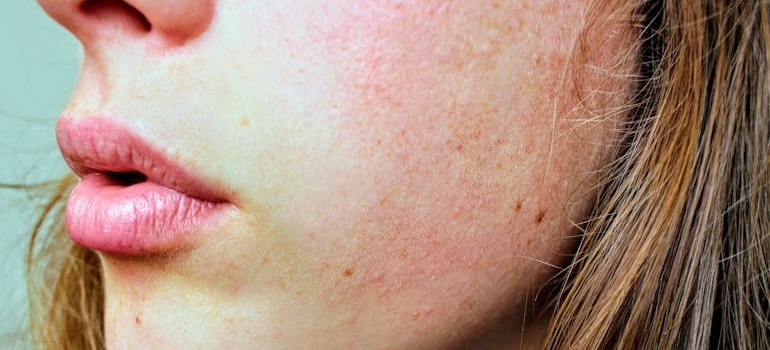
Moreover, certain drugs make people feel itchy, resulting in scratching that damages the skin further. If you’re noticing unusual marks, persistent sores, or changes in your skin’s condition, it’s important to take action. Seeking help not only addresses the sores but also the deeper health issues linked with drug use. Your skin can heal, and so can you—support is available
Common Drugs Linked to Skin Sores
Are you wondering what drugs cause skin blisters and sores? Here’s a list of common culprits that might surprise you. These substances can lead to severe skin issues, urging a closer look if you or someone you know is affected:
- Methamphetamine: Often seen in users who may seek help at a meth rehab center West Virginia offers.
- Heroin: Known for causing scabs and sores from repeated injection sites.
- Cocaine: Can reduce blood flow, leading to blistering and blackened skin.
- Synthetic cannabinoids: These can trigger severe allergic reactions, resulting in blisters.
- Prescription painkillers: When abused, they can cause itching and subsequent scratching, leading to sores.
Symptoms of Skin Sores to Watch For
Noticing unusual changes in your skin can be alarming. Here’s a list of symptoms linked to drugs and skin problems that should prompt you to consider seeking help, possibly even from facilities like heroin rehab centers:
- Redness and swelling
- Painful blisters
- Persistent itching
- Open sores or ulcers
- Abscesses
If these symptoms sound familiar, don’t ignore them. Getting help early can prevent more serious complications and support your journey to recovery. Addressing the root cause is crucial, and many resources are available to help you heal.
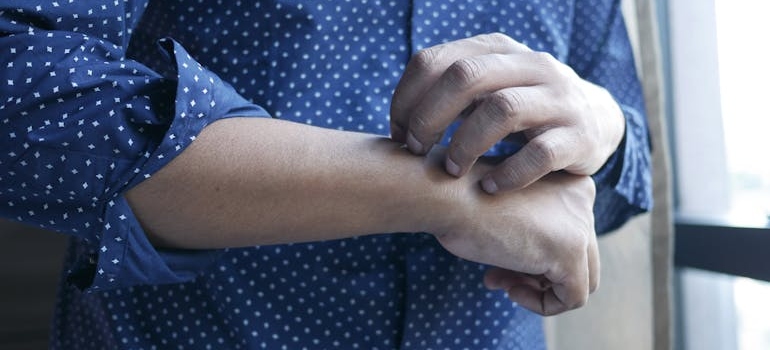
Health Risks and Complications
Drugs and skin sores can lead to serious health risks if left untreated. What starts as a minor irritation can quickly escalate into severe complications affecting your overall health. These problems can cause long-term damage and even become life-threatening. Here are common health risks linked to drug-related skin sores:
- Bacterial infections: Open wounds can become infected, leading to conditions like cellulitis or abscesses.
- Sepsis: Untreated infections can spread into the bloodstream, causing life-threatening complications.
- Scarring and skin damage: Persistent sores can leave permanent scars and skin discoloration.
- Tissue death (Necrosis): Severe infections can destroy skin tissue, requiring surgical removal.
- Amputation: In extreme cases, untreated infections may result in limb loss.
- Weakened immune system: Chronic infections can weaken the body’s ability to fight off other illnesses.
Treatment Options for Skin Sores
Are you dealing with skin eruptions from drugs? Knowing how do you treat skin eruptions from drugs can set you on the path to recovery. The first step is often visiting a healthcare provider, who can prescribe antibiotics if there’s an infection, or recommend creams to soothe irritation and promote healing. In more severe cases, you might need specialized treatments like wound care management, which cleanses the area and removes dead tissue to prevent further damage.
Additionally, addressing the underlying drug use is crucial. Facilities like an opiate rehab center can offer the support and treatment necessary to manage addiction. This dual approach of treating both the skin and addiction increases your chances of healing and prevents future issues. Don’t wait—help is available to guide you toward a healthier life.
Seeking Professional Help for Drug Use
Treating skin sores without addressing drug abuse only solves part of the problem. Drug use affects your entire body and mind, making long-term healing difficult without professional support. Medical experts can create a personalized treatment plan that targets both the physical and emotional effects of addiction. Let’s explore some treatment options that can help you recover and rebuild your life.
Detox Programs
Detox programs are the first step toward overcoming drug use and its effects, including drugs and skin sores. These programs help clear harmful substances from your body under medical supervision, making the process safer and more manageable. Inpatient drug rehab centers in West Virginia offer 24/7 care, ensuring you receive the support needed during this challenging time.
Medical staff monitor your health, manage withdrawal symptoms, and provide emotional support throughout the detox process. Detox isn’t just about stopping drug use—it’s about stabilizing your health and preparing for long-term recovery. After detox, many people transition into comprehensive rehab programs to continue their healing journey. Reaching out for help could be the most important step toward reclaiming your health and starting a new, healthier chapter in your life.
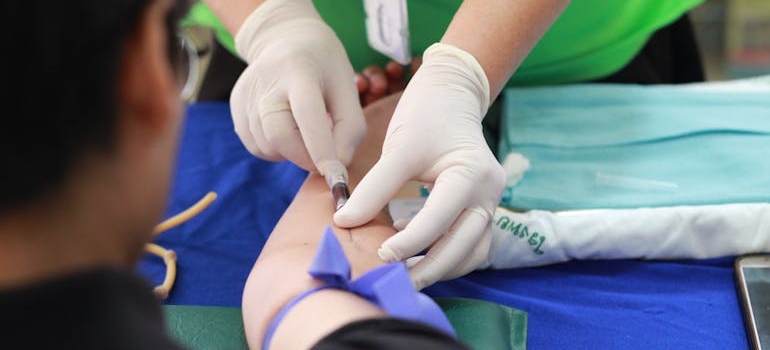
Rehabilitation Programs
Dealing with drugs and skin sores can be tough, but rehabilitation programs are here to help you regain your health and confidence. These programs provide structured treatment environments that tackle both the physical and psychological aspects of drug dependency. Options like the partial hospitalization program West Virginia residents often turn to offer intensive care during the day, allowing you to return home at night.
This setup supports your recovery while maintaining your daily routines, offering a balance that many find beneficial. With the guidance of medical professionals and support staff, you’ll learn coping strategies, receive necessary medical treatment, and participate in therapy sessions designed to help you heal. Starting a rehab program could be your first step towards a healthier, drug-free life. Don’t hesitate to reach out and take that step.
Mental Health Support Services
Feeling overwhelmed by the challenges of drugs and skin sores? You’re not alone. Mental health support services can play a critical role in your recovery journey. These services offer a safe space to discuss your struggles and find solutions that address both your mental and physical health needs:
- Individual therapy: Sessions with a licensed therapist can focus on coping strategies for dealing with the psychological impact of drug use and physical health issues. For instance, cognitive-behavioral therapy (CBT) helps modify negative thoughts and behaviors related to drug use.
- Group therapy: Participating in a group setting with others facing similar challenges can provide support and reduce feelings of isolation. These groups often meet in community centers or health clinics.
- Online counseling: For those who prefer privacy or cannot easily access traditional services, online platforms like BetterHelp or Talkspace offer therapy sessions through chat, video, or voice calls.
- Support groups: Organizations such as Narcotics Anonymous (NA) or SMART Recovery provide peer support meetings, which are essential for sharing experiences and recovery techniques in a supportive environment.

Medication-Assisted Treatment (MAT)
Medication-assisted treatment (MAT) can be a game-changer for people struggling with substance use. If you’re wondering what medication causes sores, it’s often linked to improper drug use or side effects from certain prescribed medications. MAT helps by using approved medications like methadone or buprenorphine to ease cravings and withdrawal symptoms while supporting long-term recovery.
It’s not a cure but a powerful tool when combined with counseling and therapy. Programs like drug rehab in Athens OH, offer MAT as part of a comprehensive recovery plan tailored to your needs. This approach helps stabilize your body and mind, making it easier to focus on healing and rebuilding your life. Seeking treatment can help you regain control, manage symptoms, and work toward lasting recovery. You don’t have to face this alone—help is within reach.
Home Care for Skin Sores
Taking care of skin sores at home can help prevent infections and support healing, especially when dealing with drug use and skin sores. Start by gently washing the affected area with mild soap and warm water to remove dirt and bacteria. Pat the skin dry with a clean towel—don’t rub, as this can cause irritation.
Apply an antibiotic ointment to reduce the risk of infection and cover the sore with a sterile bandage. Change the bandage daily or when it becomes dirty or wet. Avoid scratching or picking at sores, even if they itch, as this can worsen the condition. Keep your body hydrated by drinking water and eating a balanced diet to help your skin heal from within. If the sores worsen or show signs of serious infection, seek medical help right away.
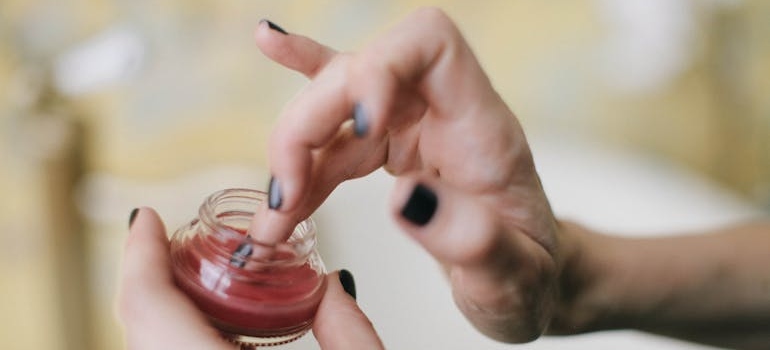
Psychological Impact of Skin Sores from Drug Use
The psychological impact of drug use and skin sores can be overwhelming. It’s not just about physical health—skin sores can affect how you feel about yourself and interact with others. Here’s how these issues can impact your mental well-being:
- Low self-esteem: Visible sores can cause shame, making you avoid social situations.
- Anxiety and paranoia: Fear of judgment or worsening symptoms can increase anxiety.
- Social isolation: People often withdraw to hide their appearance or avoid questions.
- Depression: Persistent health struggles can lead to feelings of hopelessness.
- Emotional distress: Coping with constant skin problems can feel exhausting and frustrating.
Preventive Measures to Reduce Skin Sores
Preventing drugs and skin sores starts with making healthier choices and caring for your body. Avoiding drug use is the most effective way to protect your skin from damage caused by harmful substances. If stopping feels overwhelming, seeking professional help can be life changing. Practicing good hygiene, such as washing your hands regularly and keeping wounds clean, can reduce the risk of infections.
If you have existing sores, avoid scratching to prevent further damage. Regular medical check-ups can catch problems early and provide the right treatment. Every small step toward better health can make a big difference. Remember, it’s never too late to seek help and start healing inside and out.
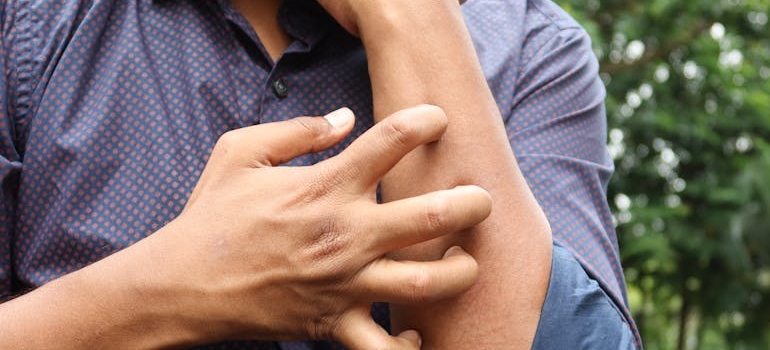
Building a Healthy Lifestyle for Skin Recovery
Recovering from drugs and skin problems involves more than just medical treatment. Building a healthy lifestyle helps your body heal faster and prevents future issues. Here are key steps to support your skin recovery:
- Eat nutritious foods: Include fruits, vegetables, and lean proteins to provide vitamins that promote skin healing.
- Stay hydrated: Drink plenty of water to keep your skin moisturized from within.
- Get regular exercise: Physical activity boosts circulation, helping your skin repair itself.
- Practice good hygiene: Clean your skin gently to avoid further irritation or infection.
- Manage stress: Find healthy coping methods like meditation or therapy to reduce stress, which can worsen skin conditions.
Taking the Next Steps Toward Better Skin Health
Dealing with drugs and skin sores can be tough, but you’re not alone in this struggle. Recognizing the issue is a huge first step towards getting better. Whether these sores are just beginning or have become a persistent problem, effective solutions are within reach. Across various settings, from local clinics to specialized centers, professionals are ready to help you heal both your skin and address the underlying issues related to drug use. You deserve to live a healthy, comfortable life. So, reach out for the help you need today and start on your path to recovery. Every step you take is a step towards a healthier tomorrow.



